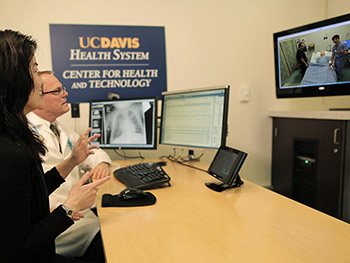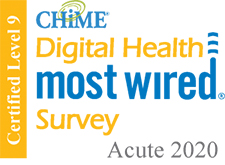Clinical Informatics Fellowship Program

UC Davis Health is uniquely positioned to provide leading-edge fellowship training in clinical informatics. Here are just a few highlights that describe why training with us is so special:
- Transdisciplinary experiences with training opportunities for physicians from many different specialties.
 Course work from UC Davis Health’s highly regarded Health Informatics program.
Course work from UC Davis Health’s highly regarded Health Informatics program.- Outstanding faculty from the Department of Public Health Sciences’ Division of Health Informatics, and the Departments of Pathology and Laboratory Medicine, Pediatrics, and Internal Medicine in the School of Medicine; the Betty Irene Moore School of Nursing; College of Engineering’s Department of Computer Science and Department of Mechanical and Aeronautical Engineering; and the School of Veterinary Medicine.
 Close integration with the UC Davis Medical Center through Chief Medical Information Officer Jeffery Wajda, D.O.. For many years, UC Davis Medical Center has earned the “Most Wired” designation as one of the nation’s top leaders in information technology, and has achieved HIMSS EMRAM Level 7 designation.
Close integration with the UC Davis Medical Center through Chief Medical Information Officer Jeffery Wajda, D.O.. For many years, UC Davis Medical Center has earned the “Most Wired” designation as one of the nation’s top leaders in information technology, and has achieved HIMSS EMRAM Level 7 designation.- Our fully deployed electronic health record supports all types of clinical care, allowing innovative quality improvement programs and an excellent environment for fellows.
 Our Clinical Translational Science Center supports training for SlicerDicer (internal link) to conduct cohort discovery queries based on Epic EHR data.
Our Clinical Translational Science Center supports training for SlicerDicer (internal link) to conduct cohort discovery queries based on Epic EHR data.- Learning projects that leverage unique resources and opportunities at UC Davis Medical Center and through UC Davis Health centers, including UC Davis Comprehensive Cancer Center, Center for Health and Technology, Center for Virtual Care, and the Center for Population Health Improvement.
- Opportunities for learning projects in clinical genomics and bioinformatics with partner NeoGenomics.
For more information on the history and background of clinical informatics and other useful information, please see the website for the American Medical Informatics Association (AMIA).
| Name | Certification (ABMS/Other) | Additional Qualifications |
|---|---|---|
| John Paul Graff, D.O. | ABMS Anatomic and Clinical Pathology |
Computer science focus of B.S. degree (Engineering Science, Vanderbilt University) Gave informatics lectures to residents based on PIER guidelines Software and app developer (hematology textbook, quiz AP) Machine Learning Working Group, UC Davis |
| Dorina Gui, M.D., Ph.D. | ABMS, ABP Pathology – Anatomic/Pathology – Clinical – General |
Advanced Degree in Medical Informatics and Biostatistics Experience teaching pathology and biostatistics courses |
| Clayton LaValley, M.D. | ABMS, ABPath Pathology- Anatomic/Clinical Pathology- Hematopathology Clinical Informatics |
Associate Program Director, Pathology Residency Medical Director, Chemistry, Special Chemistry, Urinalysis, and Toxicology Epic Physician Builder |
| Scott MacDonald, M.D. | ABMS, ABIM Internal Medicine – General ABMS, ABPM Preventive Medicine Clinical Informatics - Subspecialty |
Experience teaching in the Health Informatics Graduate Group Extensive teaching of EMR since 2004 Leads physician training program (EMR) Practicing clinical informatics in various roles leading UC Davis EHR, including medical director Informatics consultant – designing informatics tools for research studies, recruitment, manuscript review. |
| Mark L. Moubarek, M.D. | ABMS, ABEM - Emergency Medicine ABMS, ABPM - Clinical Informatics (Board Eligible) |
Assistant Professor, Department of Emergency Medicine Associate Program Director, Clinical Informatics Physician Builder, Clinical Informatics |
| Aman Parikh, M.D. | ABMS, ABEM -Emergency Medicine, ABMS, ABPM - Clinical Informatics |
Professor, Dept. of Emergency Medicine EMR Medical Director Lead Physician Builder ED EHR Director EM Lead Physician for Billing |
| Name | Certification (ABMS/Other) | Additional Qualifications |
|---|---|---|
| James Anthony Seibert, Ph.D. | ABMS, ABR Diagnostic Medical Physics Certified Imaging Informatics Professional, American Board of Imaging Informatics |
Cross-section of imaging informatics experience with clinical informatics (CIIP certification) Experience teaching classes in the Health Informatics program on issues related to imaging informatics, and mentoring students Experience teaching Radiology residents on the specific relevant topics for informatics as it applies to imaging, business analytics, image quality, dose reporting, etc. |
| Nick Anderson, Ph.D. | Experience teaching classes of biomedical informatics, data science, health informatics Chairs the Educational Policy and Curriculum, Health Informatics Graduate Group Chairs the mHealth Research Group, and the University of California Research Exchange Member of the Scientific Program Committee, AMIA Annual Meeting |
Our curriculum is tailored to the career interests and specialty background of the fellow. Together, the program director and fellow create a clinically-specific two-year individualized learning plan that leverages or enhances the existing computer science background of each fellow.
Each fellow will complete a major learning project that takes advantage of the fellow’s clinical specialty domain expertise. The project will be designed to maximize impact of health informatics on the clinical practice of the specialty. Fellows and the Chief Medical Information Officer will work together to identify and analyze problems in their clinical environment, and work with identified mentors and a project committee to identify which problem will serve as project’s focus. This team will also be engaged in project design, implementation, and conclusions. Other smaller projects may also be included during the fellowship experience.
Fellows will receive didactic instruction through course work in the Health Informatics graduate program curriculum, providing inter-disciplinary interactions with students from diverse career backgrounds. Examples of courses include:
- Introduction to Health Informatics (MHI210)
- Clinical Epidemiology and Study design (EPI205)
- Python for health informatics (MHI289I)
- Clinical Decision Support (MHI 207)
- Public Health Informatics (SPH210)
Clinical experiences that include the delivery of patient care are integrated into training in both years of the program (~20% effort).
Management experiences include opportunities to observe and participate in activities of the Health Informatics Team and the Chief Medical Information Officer’s Team.
Journal clubs are also included in the curricular experience.
Now Accepting Applications for 2026-2028.
Interviews will begin early Fall 2025 and the selection of our fellow occurring in December by AMIA Match.
Completed applications consist of the following and must include all gaps of time regardless of professional or personal:
- CV/Resume/CAP standardized form
- Personal statement
- Three (3) letters of recommendation (one must be from your Residency Program Director), please address to John P. Graff, D.O., Director, Clinical Informatics Fellowship
- Letter of interest or intent
![]() APC and CAP fellowship application guidelines (PDF link)
APC and CAP fellowship application guidelines (PDF link)
Please submit all application materials to Damaris Rodriguez, Fellowship Program Coordinator at:
pathfellowships@health.ucdavis.edu.



